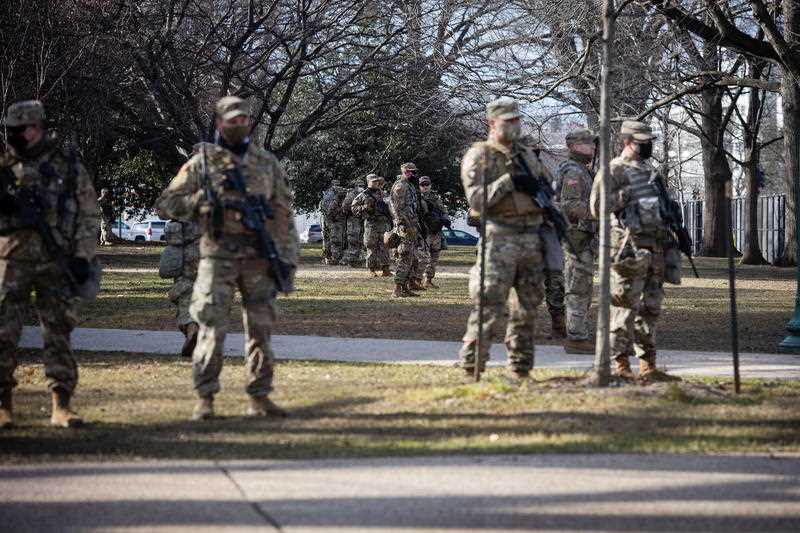Joe Biden became the 46th US president on Wednesday in a barricaded city, guarded by more than 25,000 troops and emptied of the spectators who usually throng to the quadrennial ritual.
The unprecedented precautions ensured that President Biden and Vice President Kamala Harris took their oaths of office free of incident in a ceremony outside the US Capitol, two weeks to the day after a mob attacked the building in an effort to prevent Congress from certifying their victory.
“Just days after a riotous mob thought they could use violence to silence the will of the people, to stop the work of our democracy, to drive us from this sacred ground, it did not happen. It will never happen. Not today, not tomorrow, not ever,” President Biden said.
Some right-wing extremist groups had vowed to disrupt the inauguration in the wake of the 6 January attack, but only scattered protests emerged on the day.
Outside Union Station, the city’s train terminal, National Guard troops carrying rifles stood behind razor wire-topped fencing that sealed off Capitol Hill.
A small group of protesters stood outside the security perimeter. “If Joe Biden wants to take America to hell, go right ahead!” one shouted through a bullhorn.
At Black Lives Matter Plaza near the White House, a centre of racial-justice protests in the summer, a sparse crowd cheered when President Biden mentioned that Kamala Harris would be the first Black vice president.
“I felt like a ton of weight was lifted from my shoulders,” said Tiffany Wade, who travelled with her daughter and mother from Alabama to witness the inauguration.
Earlier, outgoing President Donald Trump left the White House for the final time, his helicopter flying over thousands of American and state flags planted in the National Mall. The banners stood in for the hundreds of thousands of people who gathered for past inaugurations to watch the proceedings on big-screen televisions. Two demonstrations that had been planned along the route for the parade to the White House that follows the swearing-in ceremony had been canceled, according to the National Park Service.
Two demonstrations that had been planned along the route for the parade to the White House that follows the swearing-in ceremony had been canceled, according to the National Park Service.

Members of the National Guard keep an eye on the security perimeter around the Capitol building. Source: AAP
Dennis Pluchinsky, a former State Department terrorism analyst, said any protests would not disrupt the event. “All they are trying is to fly their flag and poison the inauguration,” he said.
The security precautions, along with a coronavirus pandemic that has prompted many to avoid public gatherings, left city streets largely empty.
“It’s, frankly, painful to see this, the whole city shut down,” former Republican Senator Jeff Flake told reporters as he arrived at the Capitol.
On Tuesday, Pentagon officials said a dozen National Guard members had been removed from inauguration duty after troops were screened for potential ties to right-wing extremism and troubling text messages.
Bridges, subway stations closed
Bridges between Virginia and downtown Washington have been closed, as were downtown Metro stations.
Some intercity bus services and passenger trains were been suspended.
With inaugural balls and other parties previously canceled due to the coronavirus pandemic, the event has taken on a somber tone in Washington.
After Twitter and Facebook suspended accounts calling for violence, organising activity has been pushed onto unmoderated channels such as 8kun.
“The FBI appears to be taking these threats seriously, but disciplined lone wolf actors, regardless of ideology, are extremely difficult to track,” said Daniel Jones, president of Advance Democracy, a nonprofit research group.


